Five Countries With the Best Public Transportation Systems

By:
In terms of countries with the best quality of infrastructure, the United States has consistently been ranked somewhere between roughly 15th and 25th for many years. The most recent World Economic Forum ranking puts the United States at number 16.
You can tell by our commutes. When you compare the United States and Europe, the United States has the third worst average commute time at just under 50 minutes. We're barely beating Romania and Hungary.
The Interstate Highway System the United States initiated in 1956 was referred to as the "greatest public works project in history." When it came about, President Eisenhower said it was "essential to the national interest," as safe and efficient roads would be crucial if there was ever an attack by a foreign nation. Since then, many nations around the world have ramped up infrastructure programs while the United States has mostly slowed down. As of 2013, the United States has the second largest highway system, after being outdone by China.
Infrastructure isn't just about long roads. Infrastructure also includes bridges, railroads, manmade waterways, and more. One has to look no further than the catastrophe we saw during Hurricane Katrina, when the levees keeping the water back broke, to see that there are systemic problems. New York during Hurricane Sandy was another tragedy. And in 2007, an eight-lane, steel bridge near Minneapolis collapsed with dozens of cars on it and killed 13 people. Infrastructure failures can be very dangerous.
Whether it's because of financial interests or just partisan politics, recent efforts to begin rebuilding our infrastructure have failed. Sen. Bernie Sanders (I-Vt.), a candidate for president, recently introduced the Rebuild America Act, but it has received little support. The bill proposes spending $1 trillion on infrastructure over five years, which would create a lot of jobs. "A $1 trillion investment in infrastructure could support 13 million decent-paying jobs and make our country more efficient, productive, and safer," Sanders said during a speech in February. He points out that the Iraq War is said to have cost over $3 trillion. For a Congress that is constantly ranting about job creation, it's a little suspect that it's not hastily picking up this bill.
If you're curious what places are putting us to shame in the world of infrastructure, look no further:
Hong Kong SAR
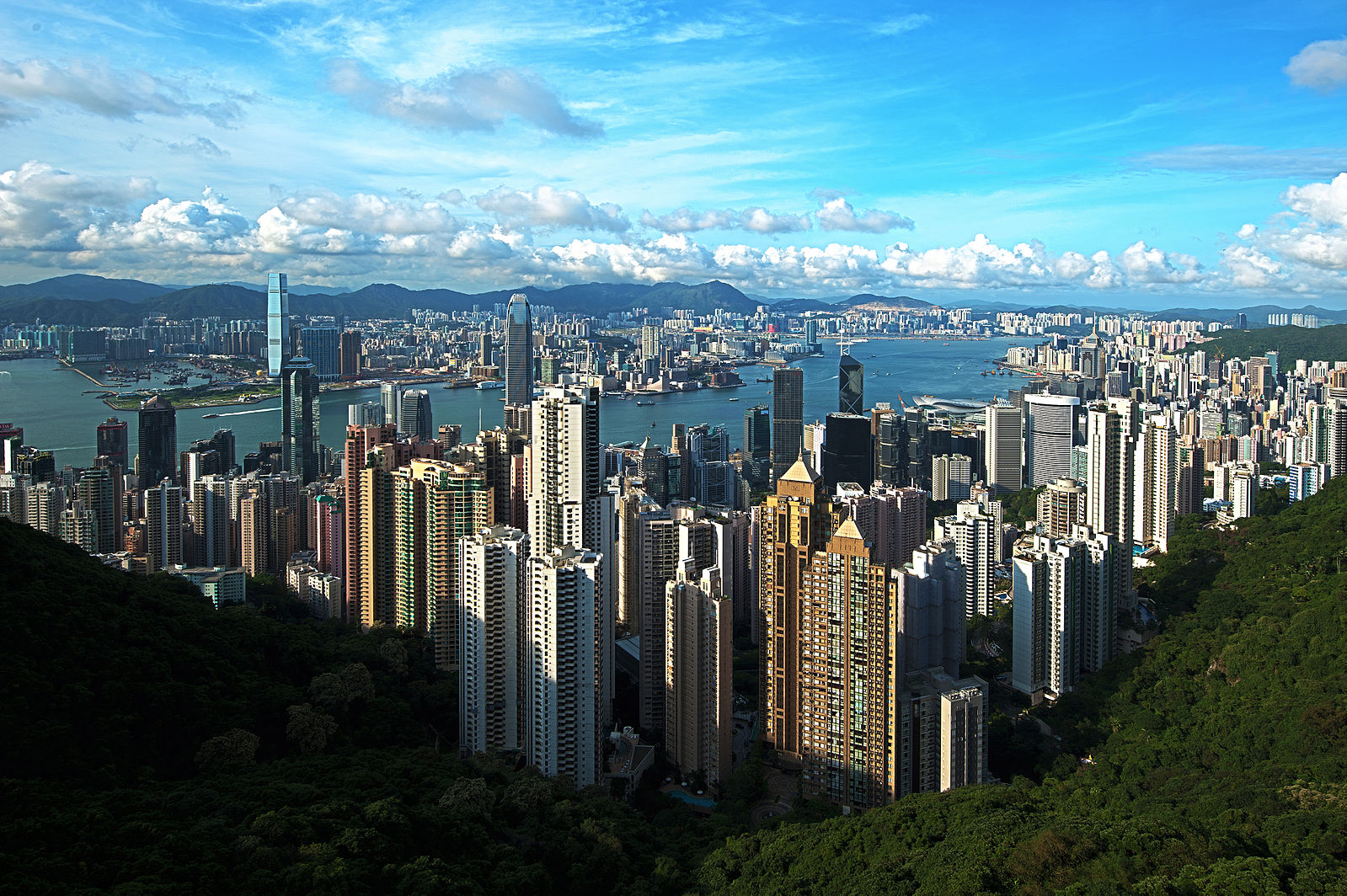
Hong Kong SAR is the city of Hong Kong and the surrounding areas. It ranks second in the world in infrastructure, including third for airport infrastructure and third for railways, according to the World Economic Forum. In the 1990s, Hong Kong literally took apart nearby mountains to build a new airport off the coast. The previous airport was becoming overcrowded and had no room to grow, so the city developers decided to create an island in a place that was previously just ocean water.
The city has also created numerous, new subway and high-speed railways in the past couple decades. The city's largest public transportation company, MTR, recently announced it will be investing $7 billion to replace 78 trains that have been running for over 35 years.
Being a place that is filled with technology companies, Hong Kong has the fastest Internet in the world. It's a quickly growing town, and the infrastructure is quickly growing with it. That being said, some budget concerns and labor shortages have slowed it down a bit.
Singapore
.jpg?auto=format&crop=faces&fit=crop&q=60&w=736&ixlib=js-1.1.0) Erwin Soo/Wikimedia - wikimedia.org
Erwin Soo/Wikimedia - wikimedia.org
Singapore is a wealthy city-state. It was recently said to be the place where people become millionaires the quickest, with it only taking them around 10 years. It's number five for overall infrastructure and number one in airport infrastructure. The city-state has high quality public transportation, flight availability, and minimal traffic compared to other places its size.
A bullet train is being developed that will take Singapore residents to Malaysia's capital city, Kuala Lumpur. The train should be finished by 2020, and it will go about 220 mph. Singapore is also focusing on train transportation within its limits, and it is in the process of adding 45 new trains for public transportation by 2018. Singapore is a high-tech city-state that has been on the cutting edge of many innovations. The city is on the cutting edge with infrastructure by utilizing new audiovisual technology for public safety and live navigation technology for efficient bus routes. (It was also recently in the news for investing in drone restaurant servers.)
United Arab Emirates
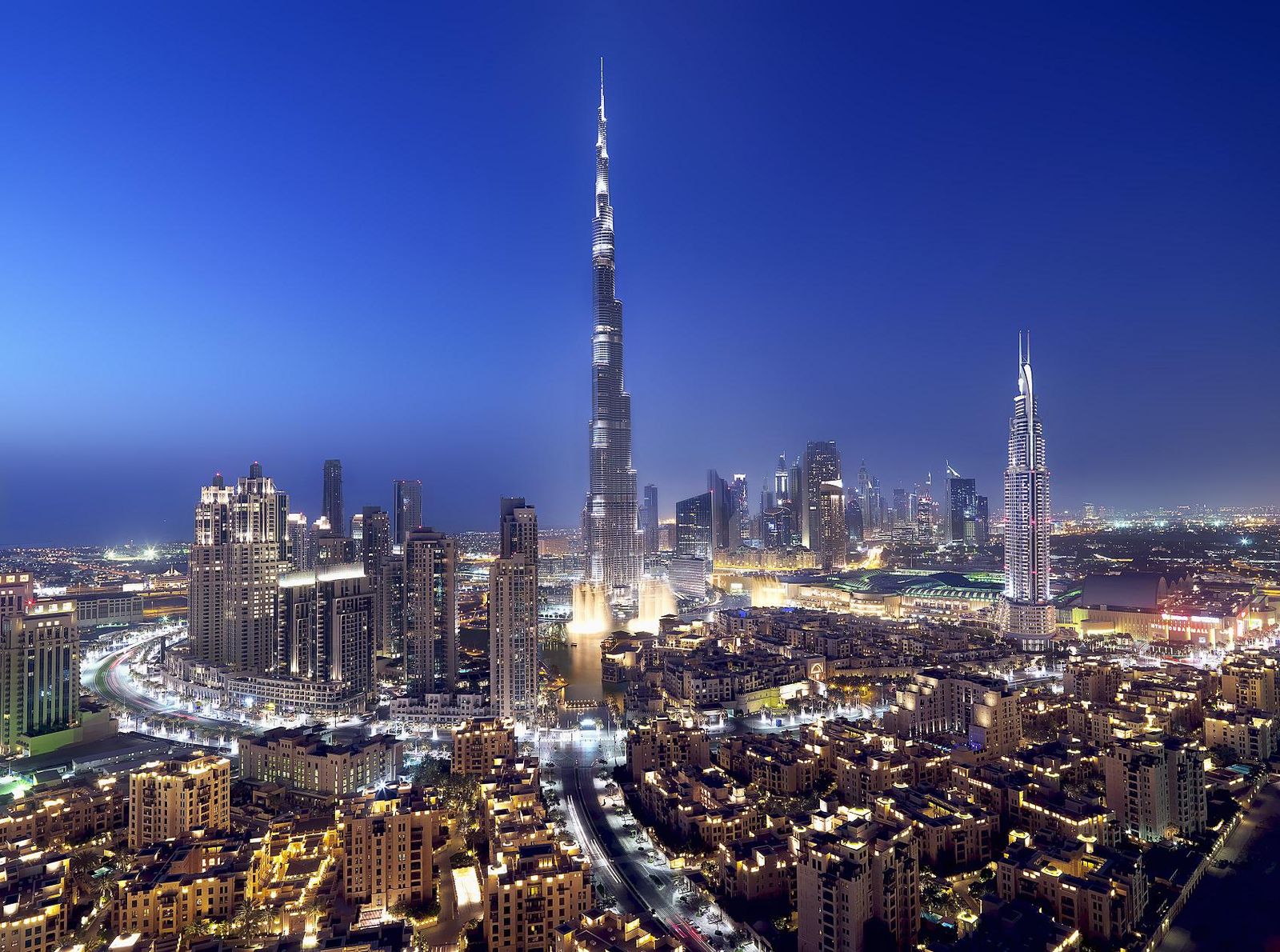
The United Arab Emirates is a place known for building big. Dubai is the country's largest city. It holds the tallest skyscraper in the world, Burj Khalifa, at over 2,700 feet tall.
The United Arab Emirates is the third overall in infrastructure and second for airport infrastructure. Dubai's airport is said to be the busiest airport in the world, with nearly 70 million people passing through in 2014. Aviation will reportedly contribute over $53 billion to the country's economy by 2020. The country is considering setting up a metro line to link its major cities within the next few years, and it is constantly updating and expanding its road networks. The UAE invested over $27 billion in infrastructure between 2003 and 2010, and it is the world's sixth richest country. Many of the country's officials have said the investment in infrastructure has contributed to the country's wealth.
Netherlands
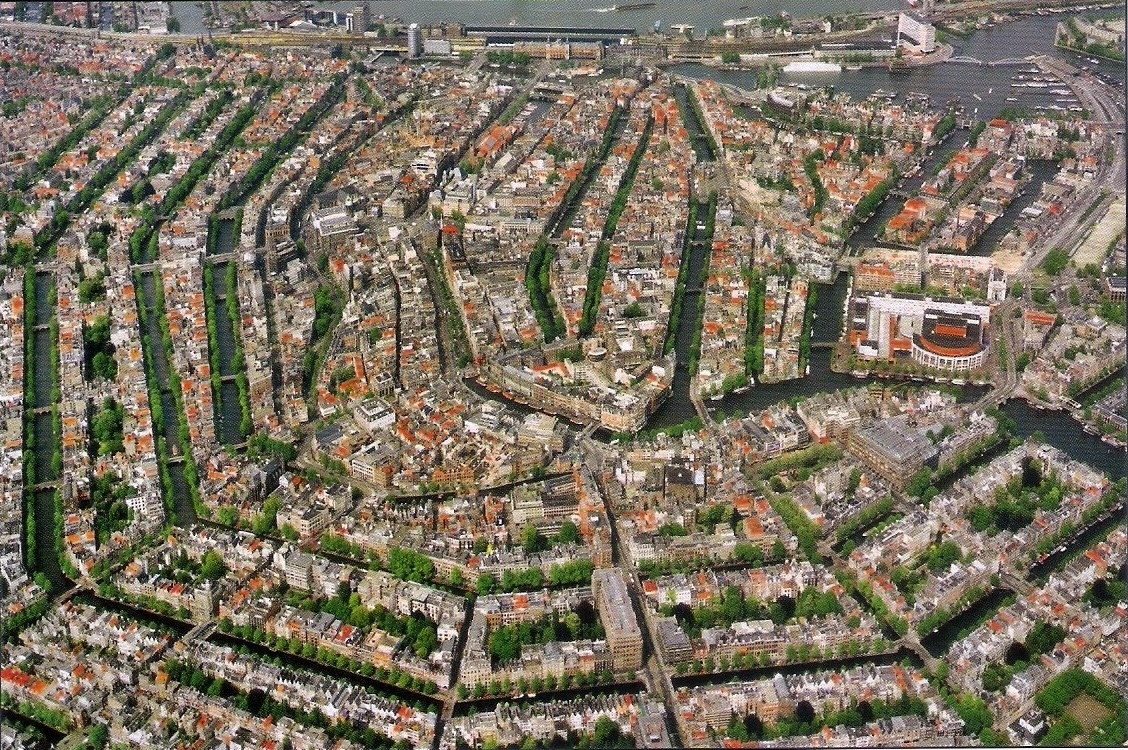 Swimmerguy269/Wikimedia - wikimedia.org
Swimmerguy269/Wikimedia - wikimedia.org
The Netherlands is sixth in overall infrastructure and number one in port infrastructure. Most places in the Netherlands are below sea level, so the country has developed some of the world's most advanced techniques for dealing with natural water flows. It has computer-operated storm surge barriers that prevent floods when extreme weather events occur. The whole country is an array of dikes, dams, and sea walls that keep its major cities from going underwater. Bicycling is extremely popular in the Netherlands, and it has a massive amount of bicycle paths and roads that transport much of the population. A new train station in the Netherlands includes a bicycle parking garage with 5,000 parking spots and electronic signs that show how many spots are available in each row. With government assistance, a group of researchers in the Netherlands rolled out the first solar road in 2014. It was also the first country to invest in roads with glow-in-the-dark markings for safer driving.
Switzerland
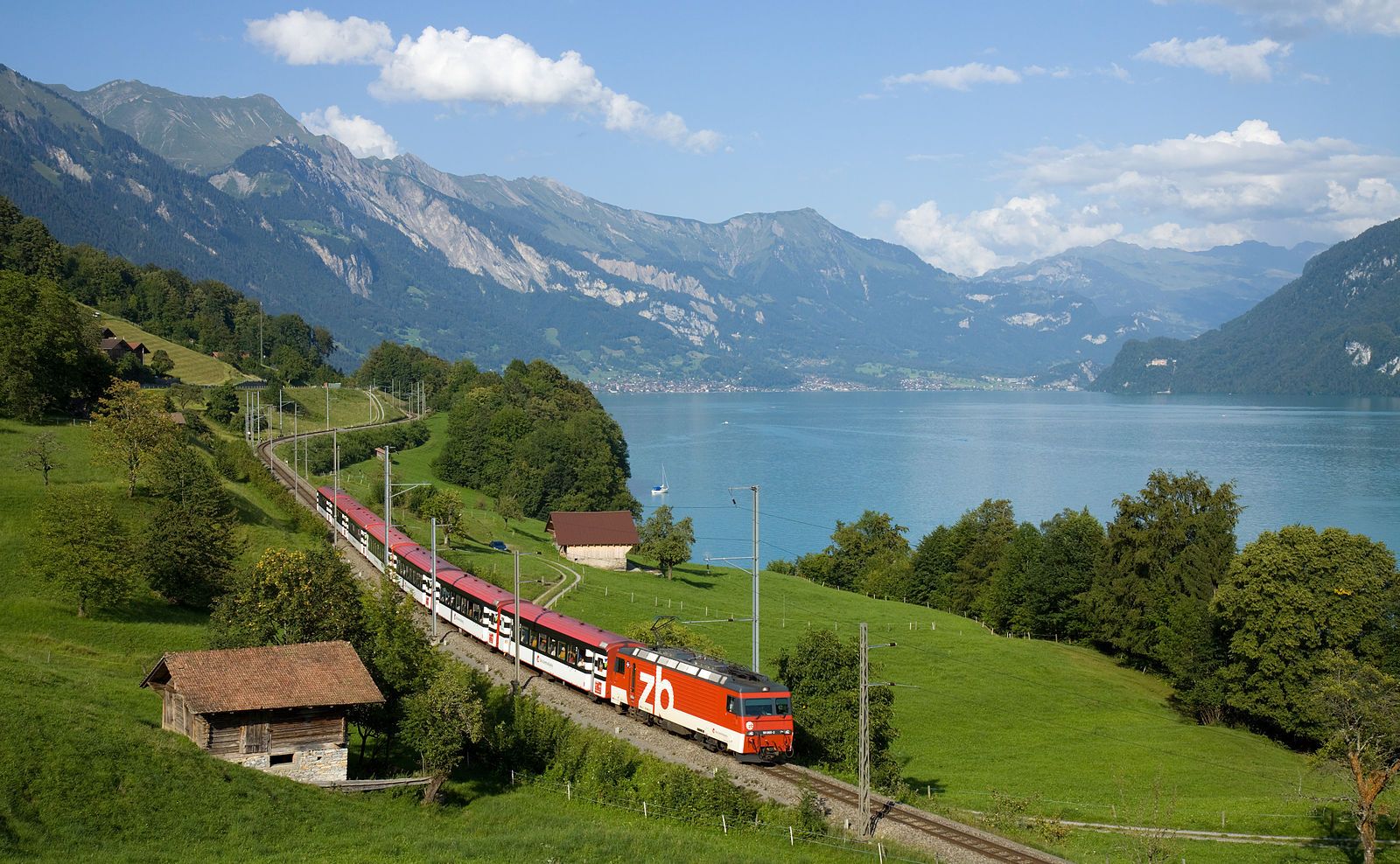 David Gubler/Wikimedia - wikimedia.org
David Gubler/Wikimedia - wikimedia.org
Switzerland is not only in the top five for being the most competitive in infrastructure, it's the number one competitive country overall, according to the World Economic Forum. The European country is number nine for quality of roads and number two for railroads. Many Swiss roads have been ranked among the best roads to drive on in all of Europe.
The Swiss Federal Railways are famous for their quality and punctuality. The small country has 9,000 trains that cover almost 2,000 miles per day. It has been found that 90 percent of Swiss train riders arrive to their destinations on time, and they make 98 percent of their train connections. The system actually has its own signature clock, and it's famous for its accuracy and aesthetics. The appearance of the clock was allegedly copied by Apple for the Apple Watch. The tech company ended up paying Switzerland $21 million for snatching the design.
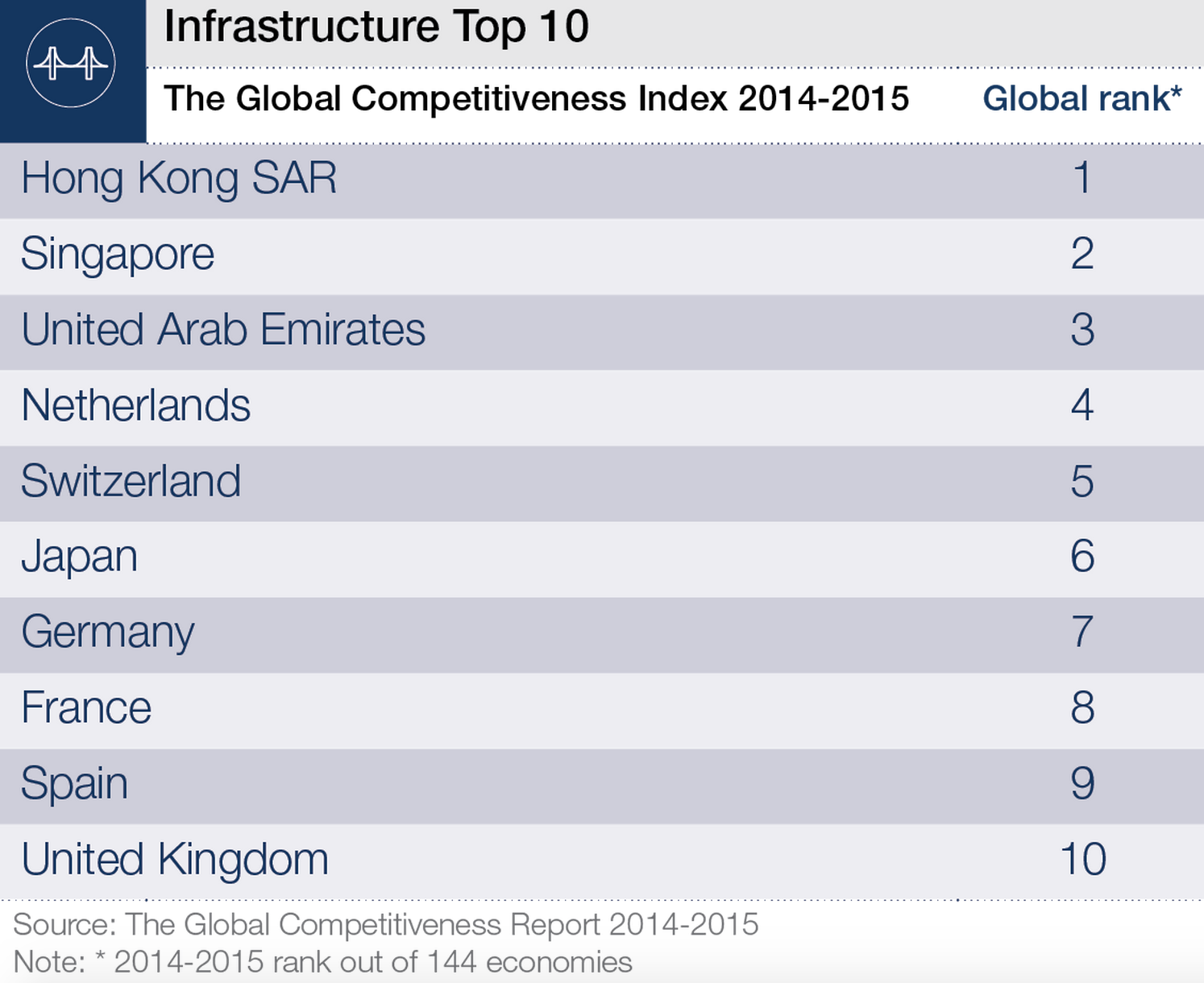 World Economic Forum - weforum.org
World Economic Forum - weforum.org
